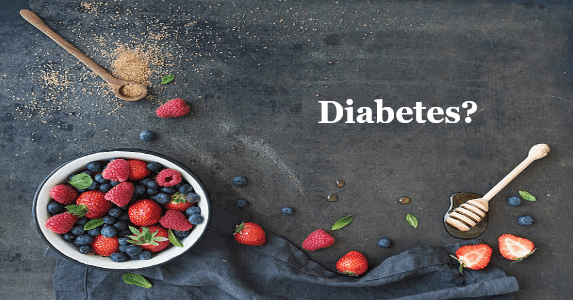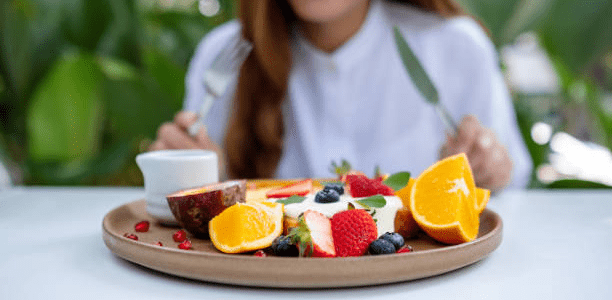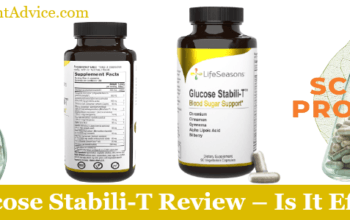
Can you get diabetes by eating sugar, fruit & honey?
There are a lot of misconceptions about that idea.
But I want to clarify things – so let's talk about:
- the effect of these foods on your body
- their influence on blood sugar levels
- the basic info about each food
So let's see if you can indeed get diabetes because of these foods.
I will explain you everything in detail below.
Note: This article is based on my research on the relation between diabetes and sugar, fruit or honey.
Diabetes & Sugar, Fruit Or Honey (In A Nutshell)
Firstly – a lot of people are wondering about the causes of diabetes.
But eating the wrong foods is definitely not the responsible.
So does eating sugar, fruits and honey give you diabetes?
The short and final answer is NO, they don't.
Consuming sugar, fruits and honey is not the root cause of diabetes.
According to current research, these foods are helpful for the body (not the other way around).
They have some major benefits for people suffering from diabetes:
- sugar can boost energy levels
- fruits provide essential nutrients
- honey is known for its antidiabetic potential
Obviously, you should eat them in moderation if you're a diabetic (following your doctor's recommendations).
But the point is that none of them are the real reasons why you have diabetes.
In fact, the root causes can be autoimmune reactions, genetic history, insulin resistance or others.
By no means – the foods you're eating.
As I said – people with diabetes are still allowed to consume those foods.
But obviously, eating them excessively can worsen your symptoms.
So if they're not the direct culprits, they can worsen an existing condition if you're eating them correctly.
Now – if you want to keep your blood glucose levels healthy, you can also take a supplement.
There are a lot of terrible products out there, to be honest.
The one I completely trust (and recommend) is Gluco Cleanse Tea.
It's a diabetes/blood sugar supplement that improves diabetes a lot more than any other product.
What makes it so superior is its unique formula:
- contains a unique mix of herbal ingredients
- each of them is backed by clinical studies
- doesn't cause any drug interactions with prescription medications
Most importantly it contains Banaba and Cinnamon.
These ingredients are known to stabilize blood glucose levels really well.
You can hardly find them in other diabetes products, so that's what makes this supplement so special.
So if you need a natural product for your diabetes (besides your treatment), Gluco Cleanse Tea is what you should try.
Can Eating Sugars Cause Diabetes?
There are a lot of myths surrounding sugars and diabetes [1]:
- diabetic people are not allowed to eat fruits
- too much sugar can cause diabetes
- sweet foods are not permitted if you have diabetes
- people with diabetes should follow a special diet
- a person with diabetes should avoid sugar at all costs
Some studies show that sugar has no unique diabetogenic effect at physiological levels [2].
In addition, here are the real reasons behind the common types of diabetes:
- Type 1 – an autoimmune reaction that destroys pancreatic cells that make insulin [3]
- Type 2 – genetic history, overweight, insulin resistance and hormonal diseases [4]
- Gestational – weight gain and insulin resistance during pregnancy [5]
With that, I will explain further on the specific effects of sugar, fruits and honey on a human's body.
#1 – Diabetes & Sugar
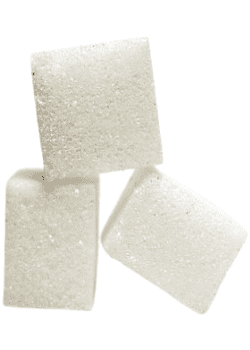
Common Name: Sugar or Table Sugar
Chemical Name: Sucrose (C12H22O11) [6]
Appearance: White odorless and crystalline/powdery solid
Taste: Sweet
Daily Recommended Intake of Sugar: not more than 30 grams (for adults) [7]
Positive Effect/s: Here are the benefits of sugar [8]:
- stimulates the release of insulin
- is a major source of energy
- promotes productivity and good moods
Honestly – we all already know what sugar is.
It's a sweet condiment that can be added to almost everything.
But can it really cause diabetes?
Well – we're going to break down how excess sugar affects your body [9]:
- higher blood pressure
- inflammation
- weight gain and obesity
- fatty liver
- increased risk of heart attack and stroke
Again – sugar is one of the major reasons some people become overweight [10].
To be specific:
- Foods and drinks with a high amount of sugar contain a lot of calories.
- Taking in more calories than what your body needs means gaining weight.
In other words, if you consume too much sugar, the excess will be converted into stored fats [11].
What happens if there are too many fats stored in your body?
Well – this excess fat will store around your internal organs and inside your liver.
This results in insulin resistance and general inflammation.
Now – take a look again at the causes of diabetes I've mentioned previously.
You can see that sugar does not directly cause diabetes.
It can only increase the risk (if you're taking in more than the recommended amount).
Overall – eating sugar alone still does not cause diabetes right away.
#2 – Diabetes & Fruits
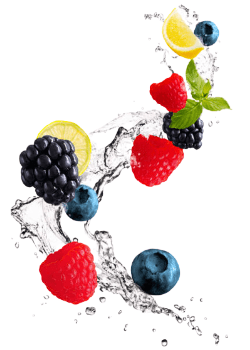
Definition: Fleshy or dry mature, ripened ovary of a flowering plant (typically enclosing the seed/s) [12]
Sugar Present: Fructose (C6H12O6) [13]
Daily Recommended Intake of Fructose: not more than 50 grams (for adults) [14]
Essential Nutrients: You can find lots of good nutrients in fruits [15]:
- vitamins (Vitamin A and Vitamin C)
- minerals
- electrolytes
- phytochemicals
Sugary Fruit/s: Here are some of the common fruits that are high in fructose:
- Grapes and Watermelon
- Apples and Pears
- Jackfruit and Mango
- Plantain and Banana
- Blackberry and Strawberry
- Plum and Cherry
Positive Effect/s: Let me share with you the benefits of fruits in our bodies [16]:
- lower blood pressure
- reduce the risk of heart disease and stroke
- prevent cancer and eye problems
- improve digestive health
- improve blood sugar
Again – there are some myths that you can get diabetes by eating fruits.
So what is the real deal behind it?
Before answering that, let's first look at the effects of excess fructose on our overall health:
- obesity and diabetes
- insulin resistance
- liver disorders or non-alcoholic fatty liver
- changes in energy metabolism [17]
- metabolic diseases (heart illnesses and stroke)
Now – fructose and glucose lead to the formation of sucrose [18].
As I said, too much sucrose is bad for the health.
That's because it can cause weight gain and inflammation.
The only situation when fruits are bad for your health is if they're consumed in excess.
But what are the odds of overconsuming fruits on a daily basis?
A normal person doesn't consume a huge amount of fruits every day.
The truth is – fruits do not affect the incidence of diabetes [19].
In fact, a regular consumption can actually lower the risk of diabetes [20].
At least that's what studies and current research proved.
Overall – the myth about fruits causing diabetes is completely false.
#3 – Diabetes & Honey

Definition: Viscous liquid with a sweet taste (usually golden brown in color) [21]
Source/s: By-product of flower nectar and upper aero-digestive tract of honey bee [22]
Sugars Present: Fructose and Glucose [23]
Daily Recommended Intake of Honey: 30 grams (for adults) [24]
Essential Nutrients: If you're curious, here are the nutrients present in honey [25]:
- minerals (potassium and calcium)
- vitamins (ascorbic acid and niacin)
- amino acids
- antioxidants
Common Use/s: There are different ways to use honey in your everyday routine:
- cough treatment
- natural food sweetener
- treats burns and wounds
- herbal infusions
- skincare
Positive Effect/s: Here are the potential benefits of honey [26]:
- antidiabetic effect
- antiviral and antifungal
- antibacterial and anti-inflammatory
- therapeutic antioxidant
- lowers total cholesterol
- heals wounds and cuts
- antidepressant and anti-anxiety
Now – honey comes with several studies about its health benefits.
But none of them proved that it can cause diabetes or that it's even linked to diabetes.
So what could possibly happen if you eat an extreme amount of honey?:
- bloating and gas
- stomach discomfort
- weight gain
- elevated blood sugar
- lowered blood pressure
- dental problems
As you can see, those side reactions have no direct effect on diabetes.
Again – honey contains fructose and glucose.
An excessive amount of glucose can indeed worsen diabetes [27].
But your body needs to metabolize honey in order for you to get its carbohydrate content.
In addition to that, you need to consume way more honey than the daily dose recommendation.
And let's be honest – who can eat so much honey on a daily basis?
But even so, there is still no direct link between honey's sugar content and diabetes.
In reality, honey has been studied for its role in diabetes management [28].
So if you're still wondering if it could potentially cause diabetes, the answer is no.
Honey will not cause diabetes at all.
Best Diabetes/Blood Sugar Supplement

But only a few are proven to be effective in real life.
So if you're looking for the best option available, there's only one product I can recommend.
Supplement Name: Gluco Cleanse Tea by Gluco Cleanse
Best Actual Price: $69 (lowest price is $49/pack)
Cheapest Place To Buy: Its official website
Designed For: Promoting normal glucose levels, as well as:
- supporting insulin sensitivity
- reducing high blood sugar
- boosting metabolism and energy
Why do I recommend it?: There are a lot of reasons.
It comes with a lot of high-quality features, unlike other diabetes products:
- the formula is made of the most powerful ingredients for diabetes/blood sugar
- unique mix of ingredients that you won't find elsewhere
- can be taken alongside prescribed treatments
- doesn't cause any concerns about drug interactions since it's a tea
- has a low risk of adverse effects
- a lot of current users proved that it's effective (over 90%)
- has an excellent quality-to-price ratio
- promotes better insulin functions and blood sugar levels
- also improves energy and metabolism (especially for carbohydrates)
Again – there are a lot of supplements for diabetes and blood sugar.
But it's still pretty hard to find a good one that actually works.
So that's why I introduced to you Gluco Cleanse Tea because I've done an extensive research and analysis about it.
Its ingredients come with several studies and clinical trials behind them.
So it's not just me saying that it works, it's science.
That's why I consider it the top diabetes/blood sugar supplement from the market.
My Verdict
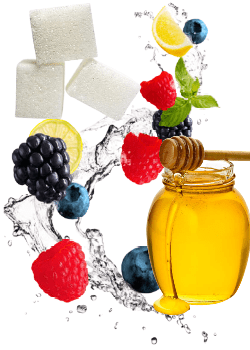
No – you will not.
Again, there are several misconceptions about those foods.
But a lot of studies cancelled those myths:
- sugar doesn't directly cause diabetes
- fruits are good for overall health
- honey actually has antidiabetic properties
Also – each type of diabetes has different causes.
However, none of them is because of sugar, fruits and honey.
Now – a high amount of glucose can trigger or worsen diabetes.
But you need to consume a literally huge serving of each food to increase your glucose level.
With that, you can still eat sugar, fruit and honey even if you have diabetes.
Well – just make sure to take them in moderation.
In addition to that, you should always monitor your blood sugar levels.
I also suggest that you partner your wellness journey with a good product.
Find a really good diabetes/blood sugar supplement that will help you stabilize your blood glucose levels.
Now – the product I can totally recommend is called Gluco Cleanse Tea.
Its formula is the best from the market in terms of addressing blood sugar.
So overall, it would be a smart and practical move to try it.
References:
1 – https://www.bhf.org.uk/informationsupport/-myths-about-diabetes/
2 – https://pubmed.ncbi.nlm.nih.gov/-27707695/
3 – https://www.cdc.gov/-diabetes/basics/-type-1-diabetes/
4 – https://www.niddk.nih.gov/health-information/-diabetes/
5 – https://www.cdc.gov/-diabetes/basics/-gestational/
6 – https://pubchem.ncbi.nlm.nih.gov/compound/-Sucrose/
7 – https://www.nhs.uk/live-well/-eat-well/-sugar-in-our-diet/
8 – https://www.ncbi.nlm.nih.gov/-pmc/articles/-PMC5775006/
9 – https://www.health.harvard.edu/heart-health/-danger-of-sugar/
10 – https://www.diabetes.org.uk/-guide-to-diabetes/-sugar-and-diabetes/
11 – https://www.sph.umn.edu/news/-excess-sugar/
12 – https://www.britannica.com/science/-fruit/
13 – https://pubchem.ncbi.nlm.nih.gov/compound/-fructose/
14 – https://www.ncbi.nlm.nih.gov/pmc/articles/-PMC3649719/-
15 – https://www.ncbi.nlm.nih.gov/-pmc/articles/-PMC2991323/
16 – https://www.hsph.harvard.edu/nutritionsource/what-should-you-eat/-fruits/
17 – https://www.eufic.org/en/whats-in-food/article/-fructose/
18 – https://www.health.harvard.edu/blog/-fructose/
19 – https://www.ncbi.nlm.nih.gov/-pmc/articles/-PMC7884895/
20 – https://www.ncbi.nlm.nih.gov/-pmc/articles/-PMC3978819/
21 – https://www.britannica.com/topic/-honey/
22 – https://www.ncbi.nlm.nih.gov/-pmc/articles/-PMC3758027/
23 – https://www.ncbi.nlm.nih.gov/-pmc/articles/-PMC5817209/
24 – https://www.cambridge.org/core/british-journal-of-nutrition/article/-honey-consumption/
25 – https://www.ncbi.nlm.nih.gov/-pmc/articles/-PMC3583289/
26 – https://www.ncbi.nlm.nih.gov/-pmc/articles/-PMC5822819/
27 – https://www.ncbi.nlm.nih.gov/-books/-NBK279510/
28 – https://www.ncbi.nlm.nih.gov/-pmc/articles/-PMC5817209/

